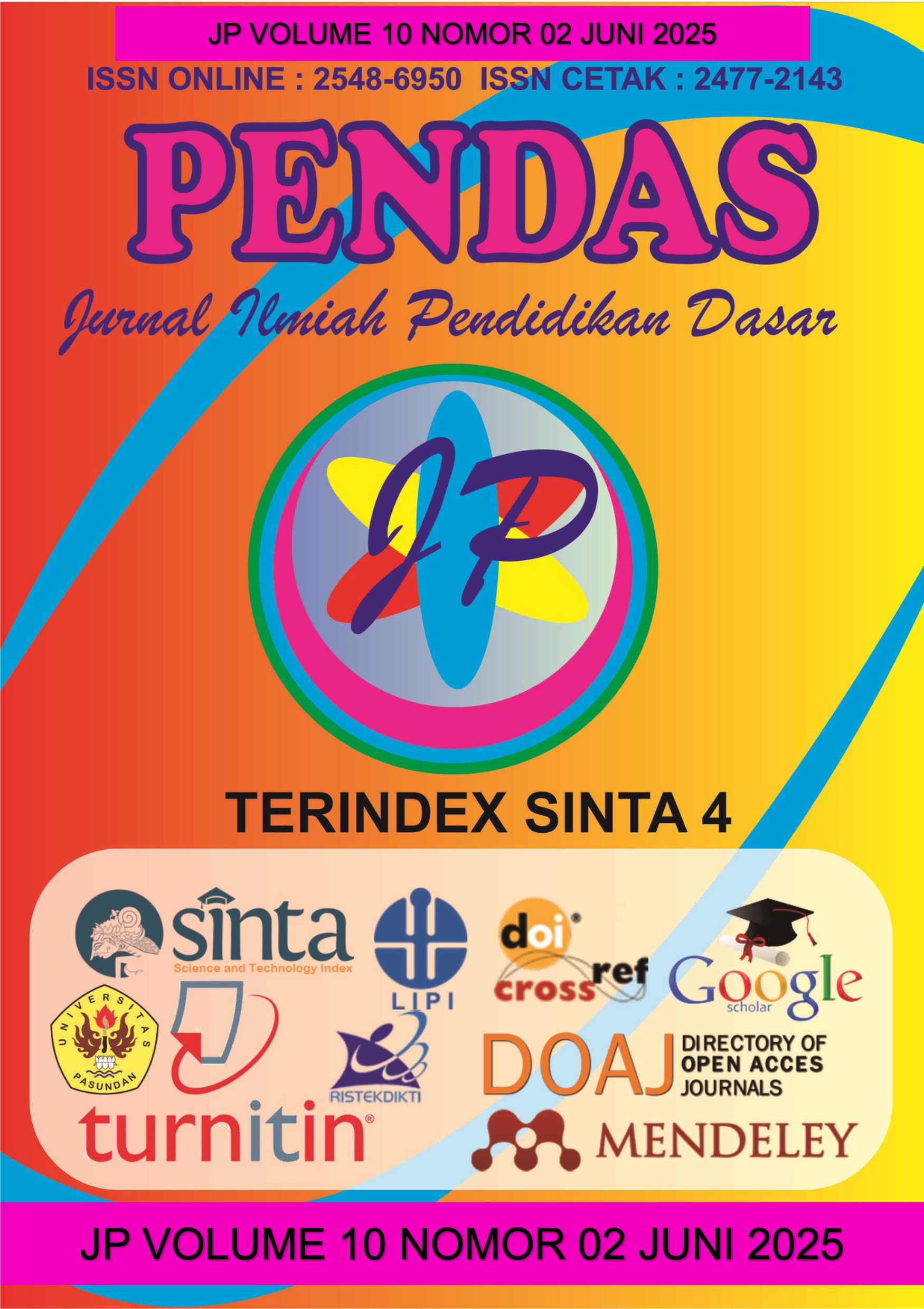PENGARUH MEDIA PEMBELAJARAN MONOPOLY EDUCATION TERHADAP HASIL BELAJAR PKN SISWA KELAS IV DI UPT SD NEGERI 3 BATANG
DOI:
https://doi.org/10.23969/jp.v10i02.25919Keywords:
Monopoly Education; Learning Outcomes; Civics (PKn); Instructional Media; Elementary SchoolAbstract
The main problem addressed in this study is the low learning outcomes in Civics (PKn) among students, which stem from unengaging teaching methods and limited interaction. The aim of this research is to investigate the effect of using Monopoly Education media on the Civics learning outcomes of fourth-grade students at UPT SD Negeri 3 Batang. This study employed a quantitative approach using a one-group pretest-posttest experimental design. The sample consisted of 20 students. Data were collected through tests, observations, and documentation. Data analysis was conducted both descriptively and inferentially using a paired sample t-test. The results of the study indicated a significant improvement in learning outcomes after the intervention, as evidenced by the difference between pretest and posttest scores and a significance value of 0.001 (p < 0.05). Additionally, students showed increased active participation, self-confidence, and understanding of civic values. In conclusion, Monopoly Education was found to be effective in enhancing both students' Civics learning outcomes and their positive attitudes toward the subject. This study contributes to the development of innovative game-based learning media as an alternative strategy to improve the quality of civic education in elementary schools.
Downloads
References
Austin, R., & Anderson, J. (2008). Building bridges online: Issues of pedagogy and learning outcomes in intercultural education through citizenship. International Journal of Information and Communication Technology Education, 4(1), 86–94. https://doi.org/10.4018/jicte.2008010108
Barnhizer, D., & Barnhizer, D. (2024). Artificial intelligence and state monopolies in education. In Human Right to Education in the Age of Innovations and Smart Technologies (pp. 67–96). Peter Lang AG.
Conway, J. M., Amel, E. L., & Gerwien, D. P. (2009). Teaching and learning in the social context: A meta-analysis of service learning’s effects on academic, personal, social, and citizenship outcomes. Teaching of Psychology, 36(4), 233–245. https://doi.org/10.1080/00986280903172969
da Cruz, C. G. (2015). Critical democratic citizenship: A learning outcome model to support engaging for justice. In The SAGE Sourcebook of Service-Learning and Civic Engagement (pp. 75–84). SAGE Publications Inc. https://doi.org/10.4135/9781483346625.n17
Dunaway, M., & Macharia, M. (2021). The effect of digital citizenship on negative online behaviors and learning outcomes in higher education. Journal of Information Systems Education, 32(4), 294–307.
Felak, J. R. (2008). Conflicts over the state monopoly of education in Slovakia, 1945–1948: Catholics, communists and democrats. Contemporary European History, 17(4), 505–522. https://doi.org/10.1017/S0960777308004682
Flanagan, E., Tondora, J., Harper, A., Benedict, P., Giard, J., & Bromage, B., et al. (2023). The Recovering Citizenship Learning Collaborative: A system-wide intervention to increase citizenship practices and outcomes. Journal of Public Mental Health, 22(3), 127–132. https://doi.org/10.1108/JPMH-12-2022-0125
Hong, E., & Rowell, L. (2019). Challenging knowledge monopoly in education in the U.S. through democratizing knowledge production and dissemination. Educational Action Research, 27(1), 125–143. https://doi.org/10.1080/09650792.2018.1534694
Kanji, H., Nursalam, N., Nawir, M., & Suardi, S. (2018). Evaluasi integrasi pendidikan karakter dalam pembelajaran ilmu pengetahuan sosial di sekolah dasar. Jurnal Etika Demokrasi, III(1), 75–84.
Lee, C.-S., & Lee, K.-W. (2021). The effectiveness of object-oriented-QR Monopoly in enhancing ice-breaking and education UX: A preliminary study. In 29th International Conference on Computers in Education Conference (ICCE 2021) – Proceedings (pp. 403–409).
Maharani, D., Afifuddin, M., Putri, D. A., Setiawan, K., & Ansari, S. A. (2019). Braille Monopoly game as a tool of disaster mitigation education for visual disabilities. In IOP Conference Series: Earth and Environmental Science (Vol. 273, Issue 1). https://doi.org/10.1088/1755-1315/273/1/012042
Mitsopoulos, M., & Pelagidis, T. (2010). The case for abolishing the higher education state monopoly in Continental Western Europe. Journal of Economic Studies, 37(1), 36–52. https://doi.org/10.1108/01443581011012252
Myers, S. A., Goldman, Z. W., Ball, H., Carton, S. T., Atkinson, J., & Tindage, M. F., et al. (2015). Assessing college student use of anti-citizenship classroom behavior: Types, reasons, and association with learning outcomes. Communication Teacher, 29(4), 234–251. https://doi.org/10.1080/17404622.2015.1064984
Na’im, M. (2020). The effect of parenting patterns and learning motivation towards citizenship lesson (PPKn) learning outcomes 11th grade SMA Negeri 3 Lumajang. In IOP Conference Series: Earth and Environmental Science. https://doi.org/10.1088/1755-1315/485/1/012096
Panjaburee, P., Hwang, G.-J., Intarakamhang, U., Srisawasdi, N., & Chaipidech, P. (2024). Effects of a personalized game on students’ outcomes and visual attention during digital citizenship learning. Cogent Education, 11(1). https://doi.org/10.1080/2331186X.2024.2351275
Rahmah, R., Suardi, S., & Rismawati, R. (2023). Pengaruh metode probing-prompting terhadap hasil belajar PKN murid kelas IV SDN 30 Sumpang Bita. Jurnal Educatia, 6(1), 7998–8010.
Rickard, M. (2022). Milton and the education monopoly. Studies in Philology, 119(3), 495–525. https://doi.org/10.1353/sip.2022.0012
Stoner, K. R., Tarrant, M. A., Perry, L., Stoner, L., Wearing, S., & Lyons, K. (2014). Global citizenship as a learning outcome of educational travel. Journal of Teaching in Travel & Tourism, 14(2), 149–163. https://doi.org/10.1080/15313220.2014.907956
Sturrock, G., & Zandvliet, D. B. (2023). Citizenship outcomes and place-based learning environments in an integrated environmental studies program. Education Sciences, 13(3). https://doi.org/10.3390/educsci13030292
Suardi, S., & Herdiansyah, H. (2019). Implementasi pendidikan karakter melalui mata pelajaran pendidikan kewarganegaraan di SMA Jaya Negara Makassar. Jurnal Etika Demokrasi, 4(1), 22–29.
Suardi, S., & Hijrah, H. (2023). Penguatan literasi guru dan siswa melalui quick response code (barcode) buku kurikulum merdeka dan media board game pada program kampus mengajar 6 di sekolah dasar. Abdimas Indonesia, 1(2), 26–32. https://dmi-journals.org/jai/article/view/226
Suardi, S., & Nursalam, N. (2023). Penguatan karakter bernalar kritis berbasis integratif moral untuk siswa sekolah dasar dalam program kampus mengajar di Indonesia. Jurnal Pendidikan Teori, Penelitian dan Pengembangan, 7(8), 335–342.
Suardi, S., Hijrah, H., Ramlan, H., Indah Ainun, M., Firdaus, F., & Syarifuddin, S., et al. (2023). Pemberdayaan guru dan siswa melalui literasi digital quick response code kurikulum 2013 dan kurikulum merdeka di SMA 11 Pangkep. Jurnal Abdimas Indonesia, 3(1), 63–76.
Tanner, M. M., & Lindquist, T. M. (1998). Using Monopoly™ and teams-games-tournaments in accounting education: A cooperative learning teaching resource. International Journal of Phytoremediation, 21(1), 139–162. https://doi.org/10.1080/096392898331225
Walsh, K. (2014). Medical education: Monopoly or oligopoly? Journal of Biomedical Research, 28(1), 71–72. https://doi.org/10.7555/JBR.28.20130189
Downloads
Published
Issue
Section
License
Copyright (c) 2025 Pendas : Jurnal Ilmiah Pendidikan Dasar

This work is licensed under a Creative Commons Attribution 4.0 International License.



















